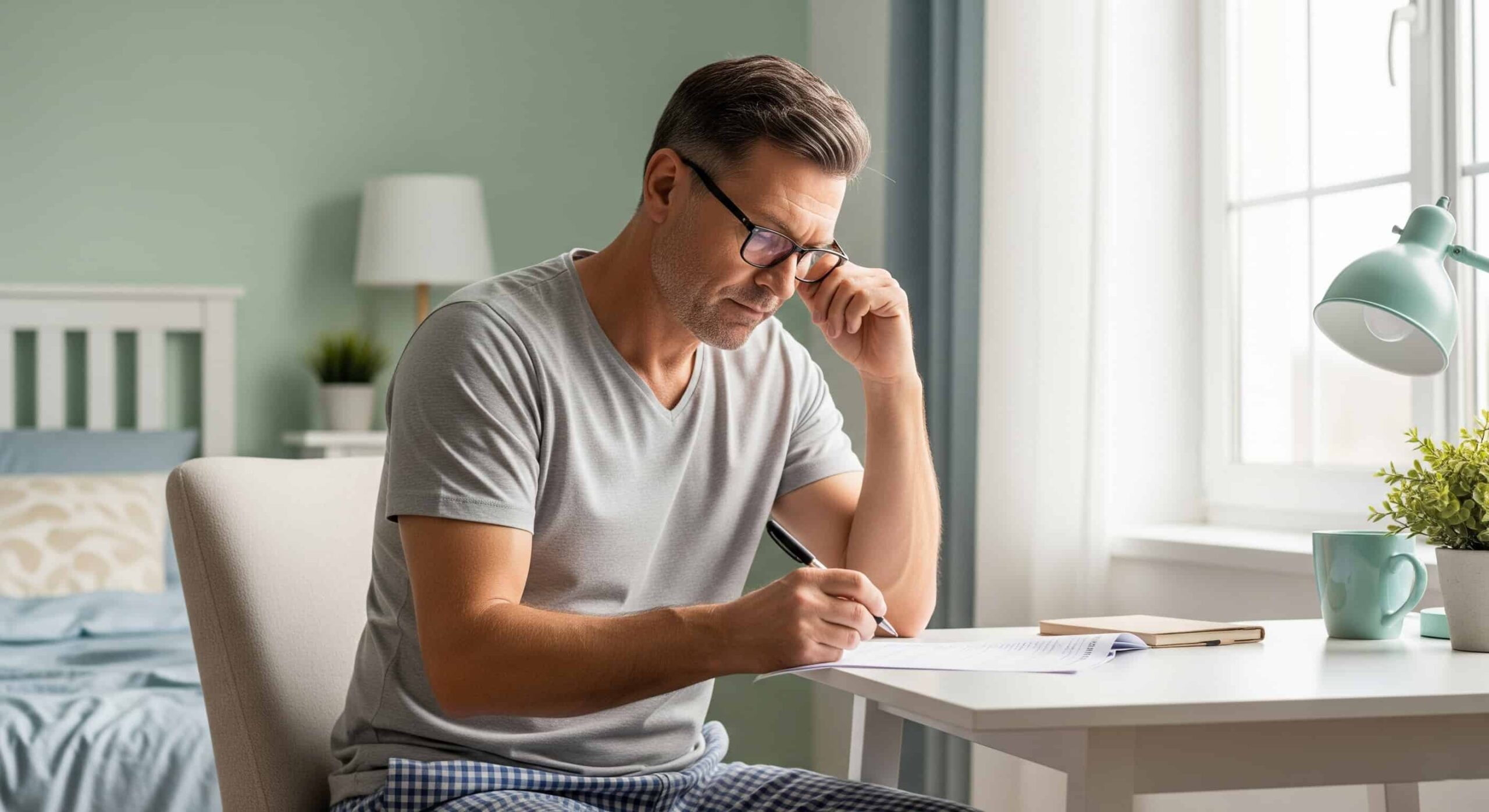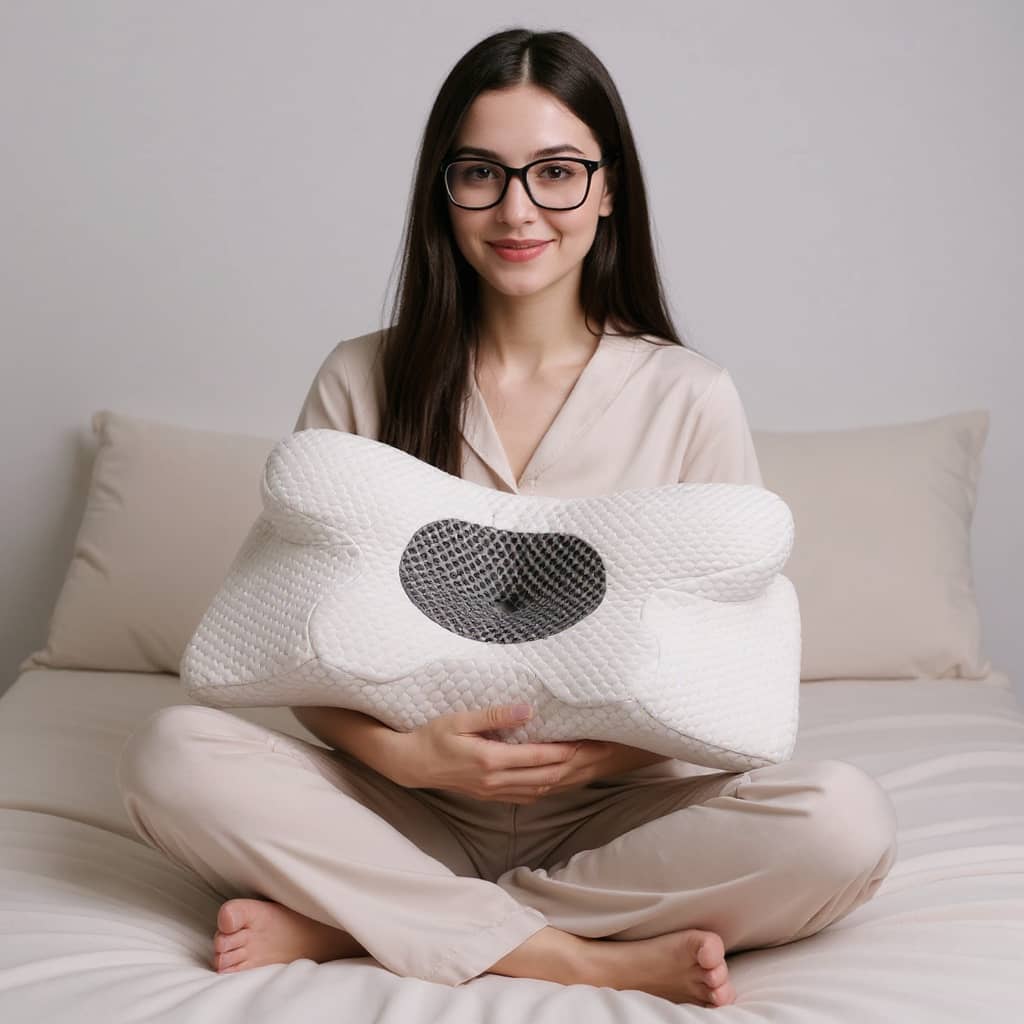Recognizing and understanding your sleep patterns is the first step toward addressing insomnia. Self-assessment tools can help you identify sleep problems, track patterns, and determine when professional help might be needed. This comprehensive guide provides validated assessment tools and practical strategies for evaluating your sleep health.
Understanding Insomnia: Types and Symptoms
What is Insomnia?
Clinical definition:
- Difficulty falling asleep (sleep onset insomnia)
- Difficulty staying asleep (sleep maintenance insomnia)
- Early morning awakening with inability to return to sleep
- Non-restorative sleep despite adequate sleep opportunity
- Daytime impairment as a result of sleep difficulties
Duration criteria:
- Acute insomnia: Less than 3 months, often triggered by stress or life changes
- Chronic insomnia: 3 or more nights per week for 3 months or longer
- Episodic insomnia: Recurring periods of sleep difficulties
Common Insomnia Symptoms
Nighttime symptoms:
- Taking more than 30 minutes to fall asleep
- Waking up frequently during the night
- Staying awake for long periods during the night
- Waking up too early and being unable to fall back asleep
- Feeling unrefreshed upon waking
Daytime symptoms:
- Fatigue or low energy
- Difficulty concentrating or remembering
- Mood disturbances (irritability, anxiety, depression)
- Decreased performance at work or school
- Increased errors or accidents
- Tension headaches
- Gastrointestinal symptoms
- Ongoing worries about sleep
Insomnia Severity Index (ISI) Self-Assessment
The Insomnia Severity Index
The ISI is a validated 7-item questionnaire designed to assess the nature, severity, and impact of insomnia. Rate each item from 0-4 based on your experience over the past two weeks:
Question 1: Difficulty falling asleep
- 0 = None
- 1 = Mild
- 2 = Moderate
- 3 = Severe
- 4 = Very severe
Question 2: Difficulty staying asleep
- 0 = None
- 1 = Mild
- 2 = Moderate
- 3 = Severe
- 4 = Very severe
Question 3: Problems waking up too early
- 0 = None
- 1 = Mild
- 2 = Moderate
- 3 = Severe
- 4 = Very severe
Question 4: How satisfied/dissatisfied are you with your current sleep pattern?
- 0 = Very satisfied
- 1 = Satisfied
- 2 = Moderately satisfied
- 3 = Dissatisfied
- 4 = Very dissatisfied
Question 5: How noticeable to others do you think your sleep problem is in terms of impairing the quality of your life?
- 0 = Not at all noticeable
- 1 = A little
- 2 = Somewhat
- 3 = Much
- 4 = Very much noticeable
Question 6: How worried/distressed are you about your current sleep problem?
- 0 = Not at all worried
- 1 = A little
- 2 = Somewhat
- 3 = Much
- 4 = Very much worried
Question 7: To what extent do you consider your sleep problem to interfere with your daily functioning?
- 0 = Not at all interfering
- 1 = A little
- 2 = Somewhat
- 3 = Much
- 4 = Very much interfering
ISI Scoring and Interpretation
Total your scores (0-28 points):
- 0-7 points: No clinically significant insomnia
- 8-14 points: Subthreshold insomnia (mild)
- 15-21 points: Clinical insomnia (moderate severity)
- 22-28 points: Clinical insomnia (severe)
What your score means:
- 0-7: Your sleep appears to be within normal limits
- 8-14: You may have mild sleep difficulties that could benefit from sleep hygiene improvements
- 15-21: You likely have moderate insomnia that may require professional evaluation
- 22-28: You have severe insomnia that definitely warrants professional treatment
Sleep Diary: Tracking Your Patterns
How to Keep a Sleep Diary
Daily tracking items:
- Bedtime: What time you got into bed
- Sleep onset time: Estimated time you fell asleep
- Sleep onset latency: How long it took to fall asleep
- Number of awakenings: How many times you woke up
- Wake after sleep onset: Total time awake during the night
- Final wake time: When you woke up for the day
- Get-up time: When you got out of bed
- Total sleep time: Estimated actual sleep duration
- Sleep quality rating: Rate 1-10 (1=very poor, 10=excellent)
Additional factors to track:
- Caffeine intake (amount and timing)
- Alcohol consumption
- Exercise (type, duration, timing)
- Naps (duration and timing)
- Medications taken
- Stress level (1-10 scale)
- Mood upon waking
- Daytime sleepiness level
Sleep Efficiency Calculation
Sleep efficiency formula:
- Sleep Efficiency = (Total Sleep Time ÷ Time in Bed) × 100
- Time in Bed = Get-up time - Bedtime
- Total Sleep Time = Time in Bed - Sleep Onset Latency - Wake After Sleep Onset
Sleep efficiency interpretation:
- 85% or higher: Normal sleep efficiency
- 80-84%: Mild sleep efficiency problems
- 75-79%: Moderate sleep efficiency problems
- Below 75%: Significant sleep efficiency problems
Example calculation:
- Bedtime: 10:30 PM
- Get-up time: 6:30 AM (8 hours in bed)
- Sleep onset latency: 45 minutes
- Wake after sleep onset: 30 minutes
- Total sleep time: 8 hours - 45 min - 30 min = 6 hours 45 minutes
- Sleep efficiency: (6.75 ÷ 8) × 100 = 84.4%
Digital Sleep Tracking Tools
Smartphone apps:
- Sleep Cycle: Uses sound analysis to track sleep phases
- Pillow: Automatic sleep tracking with heart rate monitoring
- Sleep Score: Comprehensive sleep tracking and coaching
- AutoSleep (Apple Watch): Automatic sleep detection
Wearable devices:
- Fitbit devices: Track sleep stages, duration, and quality
- Apple Watch: Sleep tracking with bedtime reminders
- Oura Ring: Detailed sleep analysis and recovery metrics
- Garmin watches: Sleep monitoring with stress tracking
Limitations to consider:
- Consumer devices may not be as accurate as clinical tools
- Movement-based tracking can misinterpret restless wakefulness as sleep
- Should supplement, not replace, subjective sleep diary data
- May increase sleep anxiety in some individuals
Additional Self-Assessment Tools
Epworth Sleepiness Scale
Rate your likelihood of dozing off in these situations (0-3 scale):
0 = Would never doze, 1 = Slight chance, 2 = Moderate chance, 3 = High chance
- Sitting and reading
- Watching TV
- Sitting inactive in a public place
- As a passenger in a car for an hour without a break
- Lying down to rest in the afternoon
- Sitting and talking to someone
- Sitting quietly after lunch without alcohol
- In a car, while stopped for a few minutes in traffic
Scoring:
- 0-5: Lower normal daytime sleepiness
- 6-10: Higher normal daytime sleepiness
- 11-12: Mild excessive daytime sleepiness
- 13-15: Moderate excessive daytime sleepiness
- 16-24: Severe excessive daytime sleepiness
Sleep Hygiene Assessment
Rate how often you do the following (Never/Sometimes/Often/Always):
- Go to bed at the same time each night
- Wake up at the same time each morning
- Use your bedroom only for sleep and intimacy
- Keep your bedroom cool, dark, and quiet
- Avoid caffeine 6 hours before bedtime
- Avoid alcohol 3 hours before bedtime
- Avoid large meals 2-3 hours before bedtime
- Exercise regularly, but not close to bedtime
- Have a relaxing bedtime routine
- Avoid screens 1 hour before bedtime
- Get natural light exposure during the day
- Limit daytime naps to 20-30 minutes
Assessment:
- Mostly "Always" and "Often": Good sleep hygiene
- Mix of responses: Room for improvement in sleep habits
- Mostly "Sometimes" and "Never": Poor sleep hygiene requiring attention
Pre-Sleep Arousal Scale
Rate how intensely you experience these symptoms as you attempt to fall asleep:
Cognitive arousal symptoms:
- Racing thoughts
- Worry about falling asleep
- Review or ponder events of the day
- Worry about problems other than sleep
- Being mentally alert, active
- Unable to shut down thoughts
- Thoughts keep running through your head
- Being distracted by sounds, noise in the environment
Somatic arousal symptoms:
- Heart racing, pounding, or beating irregularly
- Shortness of breath or labored breathing
- A jittery, nervous feeling in your body
- Muscle tension or tightness
- Cold feeling in hands, feet, or your body in general
- Having stomach upset
- Perspiration in palms of your hands or other parts of your body
Rating scale: 1 = Not at all, 2 = Slightly, 3 = Moderately, 4 = A lot, 5 = Extremely
When to Seek Professional Help
Red Flags Requiring Immediate Attention
Serious symptoms:
- Loud snoring with gasping or choking sounds
- Witnessed breathing pauses during sleep
- Excessive daytime sleepiness affecting safety (driving, work)
- Sudden onset of severe insomnia
- Sleep problems accompanied by chest pain or shortness of breath
- Sleepwalking or other unusual sleep behaviors
- Violent or aggressive behavior during sleep
Mental health concerns:
- Thoughts of self-harm or suicide
- Severe depression or anxiety
- Hallucinations or delusions
- Significant mood changes affecting daily life
When to Consult a Healthcare Provider
Duration criteria:
- Sleep problems persisting for more than 2-3 weeks
- Chronic insomnia (3+ nights per week for 3+ months)
- Sleep issues significantly impacting daily functioning
- Multiple failed attempts at self-help strategies
Severity indicators:
- ISI score of 15 or higher
- Epworth Sleepiness Scale score of 11 or higher
- Sleep efficiency consistently below 80%
- Taking more than 45 minutes to fall asleep regularly
- Waking up 3+ times per night regularly
Impact on daily life:
- Difficulty concentrating at work or school
- Increased errors or accidents
- Relationship problems due to irritability
- Physical symptoms (headaches, GI issues)
- Reliance on caffeine or other stimulants
Types of Sleep Specialists
Primary care physician:
- First point of contact for sleep concerns
- Can rule out medical causes of insomnia
- May prescribe initial treatments
- Can refer to specialists when needed
Sleep medicine specialist:
- Board-certified in sleep medicine
- Specializes in all types of sleep disorders
- Can order sleep studies if needed
- Provides comprehensive sleep disorder treatment
Behavioral sleep medicine specialist:
- Psychologist specializing in sleep disorders
- Provides cognitive behavioral therapy for insomnia (CBT-I)
- Addresses psychological factors affecting sleep
- Non-medication treatment approaches
Psychiatrist:
- When sleep problems are related to mental health conditions
- Can prescribe medications for sleep and mood disorders
- Addresses underlying psychiatric conditions
- Comprehensive mental health evaluation
Preparing for Your Healthcare Visit
Information to Gather
Sleep history:
- Completed sleep diary (2-4 weeks minimum)
- Self-assessment questionnaire results
- Timeline of when sleep problems began
- Previous treatments tried and their effectiveness
- Family history of sleep disorders
Medical information:
- Current medications and supplements
- Medical conditions and recent changes
- Recent life stressors or changes
- Substance use (caffeine, alcohol, tobacco)
- Work schedule and shift patterns
Symptom details:
- Specific sleep complaints and their frequency
- Daytime symptoms and their impact
- What makes symptoms better or worse
- Sleep environment description
- Bed partner observations
Questions to Ask Your Healthcare Provider
Diagnostic questions:
- What type of sleep disorder do I likely have?
- What tests or evaluations do you recommend?
- Could my medications be affecting my sleep?
- Are there underlying medical conditions to consider?
Treatment questions:
- What treatment options are available?
- What are the benefits and risks of each option?
- How long before I see improvement?
- What can I do at home to help?
- When should I follow up?
Lifestyle questions:
- Are there activities I should avoid?
- How will this affect my work or daily activities?
- What warning signs should I watch for?
- Are there resources or support groups you recommend?
Taking Control of Your Sleep Health
Self-assessment is a valuable first step in understanding and addressing sleep problems. By using validated tools, keeping detailed sleep records, and knowing when to seek professional help, you can take an active role in improving your sleep health.
Remember: While self-assessment tools are helpful for understanding your sleep patterns, they don't replace professional medical evaluation. If your sleep problems are significantly impacting your life, don't hesitate to seek help from a qualified healthcare provider.



